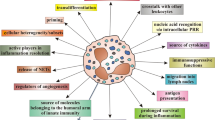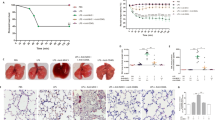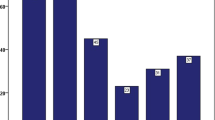Abstract
Transfusion-related acute lung injury (TRALI) is a frequent cause of transfusion-associated morbidity and mortality. Severe TRALI is often due to antibodies in blood components directed against the human neutrophil alloantigen-3a (HNA-3a). We show here that the HNA-3a antigen arises from a nucleotide polymorphism in the choline transporter-like protein-2 gene (SLC44A2), with the resulting variation at amino acid position 154 determining the reactivity of the protein with HNA-3a–specific antibodies; the variant with an arginine at this position, rather than a glutamine, constitutes the HNA-3a antigen. The molecular identification of this antigen should facilitate the development of assays for blood donor screening to lower the risk of TRALI.
This is a preview of subscription content, access via your institution
Access options
Subscribe to this journal
Receive 12 print issues and online access
$209.00 per year
only $17.42 per issue
Buy this article
- Purchase on Springer Link
- Instant access to full article PDF
Prices may be subject to local taxes which are calculated during checkout

Similar content being viewed by others
References
Holness, L., Knippen, M.A., Simmons, L. & Lachenbruch, P.A. Transfus. Med. Rev. 18, 184–188 (2004).
Vamvakas, E.C. & Blajchman, M.A. Blood 113, 3406–3417 (2009).
Kleinman, S. et al. Transfusion 44, 1774–1789 (2004).
Chapman, C.E. et al. Transfusion 49, 440–452 (2009).
Middelburg, R.A., van Stein, D., Briet, E. & van der Bom, J.G. Transfusion 48, 2167–2176 (2008).
Bux, J. & Sachs, U.J.H. Br. J. Haematol. 136, 788–799 (2007).
Strong, D.M. & Shoos Lipton, K. 〈http://www.bpro.or.jp/publication/pdf_jptrans/us/us200611en.pdf〉 (2006).
Silliman, C.C. et al. Blood 101, 454–462 (2003).
Khan, S.Y. et al. Blood 108, 2455–2462 (2006).
Popovsky, M.A. & Moore, S.B. Transfusion 25, 573–577 (1985).
Reil, A., Keller-Stanislawski, B., Guenay, S. & Bux, J. Vox Sang. 95, 313–317 (2008).
van Leeuwen, A., Eernise, J.G. & van Rood, J.J. Vox Sang. 9, 431–446 (1964).
Davoren, A. et al. Transfusion 43, 641–645 (2003).
Seeger, W. et al. Blood 76, 1438–1444 (1990).
Kopko, P.M. et al. J. Am. Med. Assoc. 287, 1968–1971 (2002).
ISBT Working Party on Granulocyte Immunobiology. et al. Vox Sang. 96, 266–269 (2009).
de Haas, M. et al. Transfusion 40, 222–227 (2000).
Nair, T.S. et al. J. Neurosci. 24, 1772–1779 (2004).
Keller-Stanislawski, B., Reil, A., Günay, S. & Funk, M.B. Vox Sang. 98, 70–77 (2009).
Soehnlein, O. & Lindbom, L. J. Leukoc. Biol. 85, 344–351 (2009).
Yasui, K. et al. Transfusion 48, 978–987 (2008).
Acknowledgements
We thank A. Teumer for running the data analysis of the Study on Health in Pomerania for population-wide gene frequency analysis of the HNA-3a–encoding polymorphism. We highly appreciate the expertise and support of J. Hoppen and H. Hippe (Chromatec) for expression of recombinant protein fragments. We thank T.E. Warkentin for valuable discussion and suggestions. This work was supported by an unrestricted grant of the Deutsche Rote Kreuz-Blutspendedienst West, Hagen, Germany; by the Land Mecklenburg-Vorpommern, Exzellenzinitiative UG 07-064; by the Bundesministerium für Bildung und Forschung, Zentrum für Innovationskompetenz Humorale Immunreaktionen bei Herz-Kreislauf Erkrankungen (ZIK-HIKE) 03Z2CK1 and 03Z2CI1 and Zentrum für Innovationskompetenz Funktionelle Genomforschung (ZIK FunGene 03ZIK331).
Author information
Authors and Affiliations
Contributions
A.G. designed the study, supervised the experiments, evaluated the results and wrote the manuscript. J.W. performed the immunoprecipitation studies, evaluated the experiments and wrote the manuscript. E.H. and U.V. performed the mass spectrometry experiments, characterized the protein and wrote the manuscript. B.F. affinity-purified the antibodies and performed the flow cytometry and chemiluminescence experiments. A.R. and J.B. contributed the human antibodies, characterized the granulocytes serologically, developed the sequence-specific PCR method, performed all granulocyte aggregation tests and wrote the manuscript. All authors read and approved the final version of the manuscript.
Corresponding author
Ethics declarations
Competing interests
The Deutsche Rote Kreuz Blutspendedienst West Hagen and the University Greifswald submitted a patent application to the Deutsche Patent und Markenamt to use the HNA-31 epitope for screening of blood donors.
Supplementary information
Supplementary Text and Figures
Supplementary Figure 1, Supplementary Table 1 and Supplementary Methods (PDF 423 kb)
Rights and permissions
About this article
Cite this article
Greinacher, A., Wesche, J., Hammer, E. et al. Characterization of the human neutrophil alloantigen-3a. Nat Med 16, 45–48 (2010). https://doi.org/10.1038/nm.2070
Received:
Accepted:
Published:
Issue Date:
DOI: https://doi.org/10.1038/nm.2070
This article is cited by
-
HNA-3a and HNA-3b antigens among 9 ethnic populations and the Han population in Southwest China
Journal of Translational Medicine (2018)
-
Innate immune responses to trauma
Nature Immunology (2018)
-
Expression of choline and acetylcholine transporters in synovial tissue and cartilage of patients with rheumatoid arthritis and osteoarthritis
Cell and Tissue Research (2015)
-
Hair Cell Loss, Spiral Ganglion Degeneration, and Progressive Sensorineural Hearing Loss in Mice with Targeted Deletion of Slc44a2/Ctl2
Journal of the Association for Research in Otolaryngology (2015)
-
Bovine neonatal pancytopenia - Comparative proteomic characterization of two BVD vaccines and the producer cell surface proteome (MDBK)
BMC Veterinary Research (2013)



